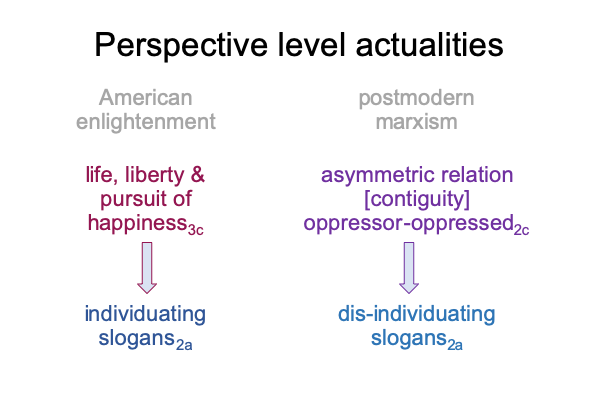0031 From the masterwork, How To Define the Word “Religion“, one finds that there are three tiers to the presence underlying the word, “religion”.
They are the societyC, organizationB and the individual in communityA.
The society tierC puts the organization tierB into perspective. The organization tierB emerges from (and situates) the individual in communityA.
Each tier is diagrammed as a three-level interscope.
0032 So, let me talk business.
When an young individual in communityA enters the organization tierB, by going to work, “he” engages a number of asymmetric relations.
How does a young personA navigate these relationsB?
Obviously, the individual in communityA relies on what “he” has been taught.
0033 American classical liberals teach that the individual should have a dream2a.
French classical liberals instruct the individual with tropes about equality, freedom and human brotherhood2a. These expectations2a encourage asymmetric business relations to be “win-win”.
Marxist (il)liberals indoctrinate slogans raising awareness of how asymmetric relations between individuals somehow cause (are contiguous with) systemic oppression2a.
0034 Liberalism offers a dream. Marxism offers a nightmare. Choose your false consciousness.
0035 Hazony describes the pairing as a dance. In this dance, one party negates the other. Thus, the dance is more like the mating ritual between the male and the female praying mantis. The dance ends when liberalism gets devoured as food for the fertilized egg sacs of marxism. Afterwards, an all-consuming fecund marxism dies from her own contradictions, in the winter of her totalizing reign.
0036 Why do I say this?
Compare the perspective-level actualities2c for American enlightenment and postmodern marxism.

0037 When the American enlightenment is reflected in the mirror of the world3a, slogans2a call for individuation1b. The asymmetric relations characterizing the organization tier are depicted as opportunities and hazards for fashioning a dream2a based on one’s talents and dispositions1a. When confronted with oppressors, the individual should learn how to detect, avoid and escape. When confronted with mentors, the individual should figure ways to flourish.
0038 Indeed, in America, opportunities1b for success are manifold, ask any movie actress2b promoted by the notorious Harvey Winerock, who turns out to be a postmodern marxist2a,b,c.
In contrast, millions of less-promoted actresses now live in movies of their own, the comedies and tragedies of life in the family2aB, the traditional portal to the organization tierB. For every one actress who reaches an accommodation2b with Harvey, by playing through his disgusting game1b, millions of women discover that the asymmetric relations inherent in the family realize2b their dreams2a.
Who should be teaching whom?
Surely, a Hollywood actress stands in asymmetric relation to innumerable mothers, among others.
So, what does she preach?
Marxist slogans2a?
Why?
In order to attain her dream2b, she is required to become so oppressed2c that she cannot recognize herself as an oppressor2c. She lives out the scientific truth of marxism2c. She submits1b and receives both rewards and marxist illumination2b.
0039 Why are so many civic institutions of American liberalism now controlled by marxists?
The marxist perspective translates the asymmetric relations of the organization tierB into the languages of oppressor and oppressed. Mirroring this perspective2c, slogans2a emerge from a righteousness1a that demands submission of the oppressors1b. One party in all asymmetric relationsB is already guilty of oppression1a on the basis of participation in the system. That party cannot be the marxist, who represents the oppressed.
By definition, the oppressed2c, such as Harvey Winerock and the Hollywood actress, are exempt because each is a marxist occupying a powerful position in a once civic, now marxist, institution. Each, in his and her own way, is a victim in an asymmetric relation with a more powerful individual.
For the actress, that more powerful individual is Harvey.
For Harvey, that more powerful individual is the one who bought his soul.
